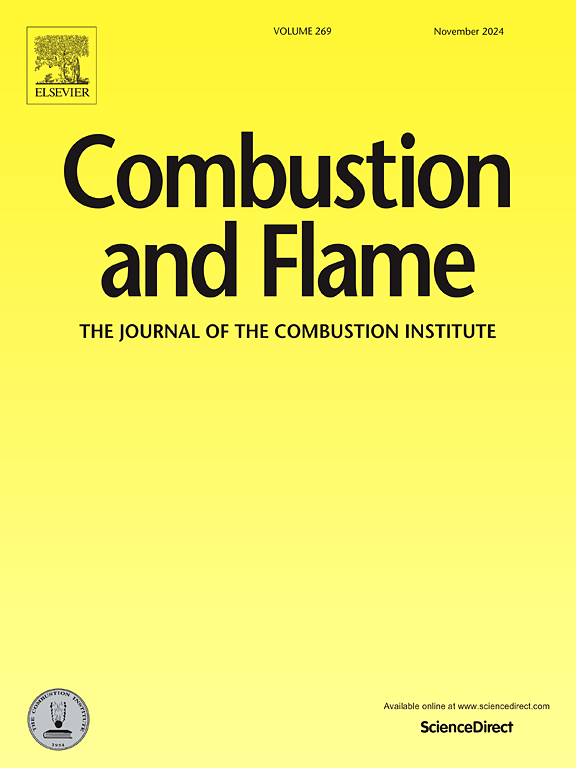The role of reaction directions for thermochemistry impacts on chemical kinetic model predictions
IF 6.2
2区 工程技术
Q2 ENERGY & FUELS
引用次数: 0
Abstract
Thermochemical species properties can have a significant effect on kinetic model predictions due to their impacts on the chemical equilibria of elementary reactions, as demonstrated in several recent studies by means of sensitivity analysis and uncertainty quantification methods. Since the reverse rate coefficients are commonly obtained from the forward rate coefficients and the equilibrium constants (which depend on the thermochemistry data of the involved species), the sensitivities of quantities of interest on the thermochemical properties are expected to depend significantly upon the directions for which the forward rate coefficients are provided in a model. Nevertheless, this dependence has not yet been well quantified in the literature. Deeper insight is thus of high interest. The present work systematically assesses the extent to which the sensitivities on thermochemical properties as well as the resulting uncertainties in model predictions depend upon the choice of forward reaction directions. The mechanisms of two exemplary fuel components, i.e., diethyl ether and -heptane, are assessed for ignition conditions. When all reactions are defined in their respective main directions of net reaction flux at the conditions of interest, the impacts of thermochemistry data on model predictions are shown to become relatively low. In particular, only the thermochemistry data of reactants and products of the low-temperature isomerization reactions are found to be moderately sensitive at intermediate temperatures in that case. Conversely, the prediction uncertainties due to thermochemistry data can be more than an order of magnitude higher when all reactions are defined contrary to their main directions of net reaction flux. These results highlight the relevance of the selection of forward reaction directions in terms of minimization of model prediction uncertainties caused by the thermochemistry data, especially if relatively accurate kinetic rate data are available. Further practical implications are finally discussed.
Novelty and significance statement This work evaluates quantitatively the impacts of the choice of forward reaction directions on the sensitivities of prediction targets on thermochemical properties and the resulting uncertainties in model predictions for the first time. It is found that the model prediction uncertainties can be minimized, if all reactions are defined in their respective directions of net reaction flux. The results of this work highlight the importance of the selection of reaction directions in the model development for the minimization of model prediction uncertainties caused by the thermochemistry data.
热化学反应方向对化学动力学模型预测的影响
最近的一些研究通过灵敏度分析和不确定度量化方法证明,热化学物质的性质对动力学模型的预测有重要影响,因为它们对基本反应的化学平衡有影响。由于反向速率系数通常是从正向速率系数和平衡常数(取决于所涉物种的热化学数据)中获得的,因此预计感兴趣的量对热化学性质的敏感性在很大程度上取决于模型中提供正向速率系数的方向。然而,这种依赖性在文献中尚未得到很好的量化。因此,人们对更深入的了解非常感兴趣。本工作系统地评估了热化学性质的敏感性以及模型预测中由此产生的不确定性在多大程度上取决于正向反应方向的选择。两种典型的燃料成分,即乙醚和正庚烷的机制,评估了点火条件。当所有的反应都在各自的净反应通量的主要方向上定义时,热化学数据对模式预测的影响就变得相对较低。在这种情况下,只有低温异构化反应的反应物和产物的热化学数据在中等温度下是中等敏感的。相反,当所有反应的定义都与净反应通量的主要方向相反时,由热化学数据引起的预测不确定性可能会高出一个数量级。这些结果强调了选择正反应方向在最小化由热化学数据引起的模型预测不确定性方面的相关性,特别是在相对准确的动力学速率数据可用的情况下。最后讨论了进一步的实际意义。本工作首次定量评估了正反应方向的选择对预测目标对热化学性质的敏感性的影响,以及模型预测中产生的不确定性。研究发现,如果所有反应都在各自的净反应通量方向上定义,则模型预测的不确定性可以最小化。本工作的结果强调了在模型开发中选择反应方向对于最小化由热化学数据引起的模型预测不确定性的重要性。
本文章由计算机程序翻译,如有差异,请以英文原文为准。
求助全文
约1分钟内获得全文
求助全文
来源期刊

Combustion and Flame
工程技术-工程:化工
CiteScore
9.50
自引率
20.50%
发文量
631
审稿时长
3.8 months
期刊介绍:
The mission of the journal is to publish high quality work from experimental, theoretical, and computational investigations on the fundamentals of combustion phenomena and closely allied matters. While submissions in all pertinent areas are welcomed, past and recent focus of the journal has been on:
Development and validation of reaction kinetics, reduction of reaction mechanisms and modeling of combustion systems, including:
Conventional, alternative and surrogate fuels;
Pollutants;
Particulate and aerosol formation and abatement;
Heterogeneous processes.
Experimental, theoretical, and computational studies of laminar and turbulent combustion phenomena, including:
Premixed and non-premixed flames;
Ignition and extinction phenomena;
Flame propagation;
Flame structure;
Instabilities and swirl;
Flame spread;
Multi-phase reactants.
Advances in diagnostic and computational methods in combustion, including:
Measurement and simulation of scalar and vector properties;
Novel techniques;
State-of-the art applications.
Fundamental investigations of combustion technologies and systems, including:
Internal combustion engines;
Gas turbines;
Small- and large-scale stationary combustion and power generation;
Catalytic combustion;
Combustion synthesis;
Combustion under extreme conditions;
New concepts.
 求助内容:
求助内容: 应助结果提醒方式:
应助结果提醒方式:


